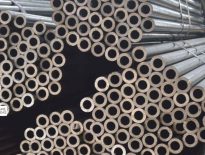What is Carbon Steel A106 Grade B?
Steel with a carbon content of up to 2.1% by weight is called carbon steel. The American Iron and Steel Institute’s (AISI) definition of carbon steel reads as follows: steel when: no minimum content is stipulated or required for chromium, cobalt, molybdenum, nickel, niobium, titanium, tungsten, vanadium, or zirconium to be added to achieve the desired binding effect; the minimum specified for copper does not exceed 0.40 percent or the maximum content stipulated for any element; When used in this way, the phrase “Carbon Steel A106 Grade B Pipes” can apply to any steel, including alloy steel, that is not stainless steel.
The term “ASTM 106 pipe” designates seamless carbon steel pipes that have been hot-rolled or cold-drawn (rolled). Seamless pipe used in high-temperature applications is covered by ASTM A106 standard specification. As a result, it can be used to transport fluids (such as water, oil, gas, or slurry), making it a crucial component of the mining industry.
Materials Grades ASTM A106
There are three categories of ASTM A106 materials based on the material’s chemical makeup (primarily Maximum Carbon percentage). These are:
Maximum 0.25% carbon content in A106 Grade A.
A106 Grade B, with no more than 0.30% carbon, and A106 Grade C, with no more than 0.35% carbon
The range of manganese’s percentage also changes slightly between grades in the chemical composition of the various classes, as was previously noted. The manganese content in A106 Grade A typically ranges from 0.27 to 0.93%, whereas it does the same for Grades B and C (0.29 to 1.06%). All three classes of Sa 106 gr B Chemical Composition have the same maximum proportion of additional elements like phosphorus, sulfur, silicon, copper, chromium, molybdenum, nickel, vanadium, etc. To be safe, ASTM A106 states that the cumulative percentage of all these other materials must not be greater than 1%.
ASTM A106 Grade B Material Specification
| Standards | ASTM, ASME and API, ANSI B 36.10 |
|---|---|
| Craft | Cold rolled and Cold drawn |
| ANSI Standard | B1.20. |
| Grades | ASTM A106 Grade A, Grade B, Grade C |
| Type | ERW / Seamless / Fabricated / Welded |
| Size | 1/2” NB to 36” NB |
| Length | Minimum 3 Meters, Maximum 18 Meters |
| Thickness | 3-12mm |
| Specialized in | Large Diameter ASTM A106 Grade B Pipe |
| Schedules | Schedule 20, 30, 40, Standard (STD), Extra Heavy (XH), 80, 100, 120, 140, 160, XXH & heavier |
| ASME Standard | B36.10M |
| Tolerance | Cold drawn pipe: +/-0.1mm
Cold rolled pipe: +/-0.05mm
|
| End | Plain End, Beveled End, Treaded |
ASTM A106 Grade B Pipes Chemical Composition
| Element | ASTM A106 Carbon Steel Gr. B |
| C | 0.30 |
| Mn | 0.29-1.06 |
| P | 0.04 |
| S | 0.04 |
| Cu | 0.40 |
| Ni | 0.40 |
| Cr | 0.4 |
| Mo | 0.15 |
| V | 0.08 |
ASTM A106 Gr. B Pipes Mechanical & Physical Properties
| Element | ASTM A106 Carbon Steel Gr. B |
| Tensile Strength | 60,000 (415) MPa |
| Yield Strength (0.2%Offset) | 35,000 (240) MPa |
Conclusion
ASTM A106 Grade B IBR Pipe is a top choice for high-temperature and high-pressure applications due to its excellent properties. This seamless carbon steel pipe offers impressive tensile strength, corrosion resistance, and durability, making it suitable for a wide range of industrial uses. The IBR certification guarantees that this pipe meets stringent quality and safety standards. For your next project, ASTM A106 Grade B IBR Pipe provides a reliable and effective solution.
FAQs
What is ASTM A106 GR B grade?
ASTM A106 GR B Grade is a carbon steel pipe specification for high-temperature service. It’s commonly used in industrial plants, power plants, refineries, and chemical plants. ASTM A106 Grade B provides good mechanical properties and resistance to high temperatures.
What is ASTM a106b equivalent to?
ASTM A106 Grade B is equivalent to ASTM A53 Grade B, API 5L Grade B, DIN 17175 St35.8, JIS G3454 STPG 370, and BS 3601 360A. These standards share similar chemical compositions and mechanical properties for high-temperature applications.
What is ASTM A106 Grade B material?
ASTM A106 Grade B is a carbon steel material specification used primarily for seamless piping applications under high-temperature and high-pressure conditions. It is widely utilized in various industries, including:
- Industrial Plants
- Power Plants
- Refineries
- Chemical Plants
The pipe made from ASTM A106 Grade B is known for its strength and durability, making it suitable for conveying fluids in demanding environments.


